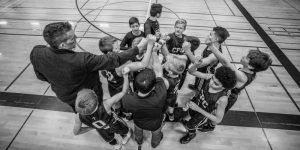15 Best Sports Psychology Degrees, Courses, & Programs
 Over the last 20 years, the field of sports psychology has grown dramatically, with a significant increase in the number of practitioners globally (Cotterill & Breslin, 2017).
Over the last 20 years, the field of sports psychology has grown dramatically, with a significant increase in the number of practitioners globally (Cotterill & Breslin, 2017).
Indeed, sports psychology has developed into a high-profile, international enterprise engaged in almost all elite sports (Kremer, Moran, & Kearney, 2019).
Such growth has led to notable advances in research and training and the acceptance that to do well, individuals and teams must have their mindsets in order. According to neuroscientist Vincent Walsh, “the reasons people lose are mental, not physical or technical” (New Scientist, 2016).
This article introduces the sports psychologist’s role, the training available, and how to develop your career.
Before you continue, we thought you might like to download our three Goal Achievement Exercises for free. These detailed, science-based exercises will help you or your clients create actionable goals and master techniques to create lasting behavior change.
This Article Contains:
What Do Sports Psychologists Do?
The importance of the mental aspect of competitive sports has probably been known for as long as humans have taken sports seriously.
Its role in the success of top sportspeople is less about being more successful than others and increasingly about performing better than previously.
Sports psychology aims to “identify, harness, and train” clients’ mental skills to ensure that they are solely limited by their physical capacity rather than any psychological baggage (Kremer et al., 2019).
While sports psychologists must deal with a range of personal issues, specific key topics require regular focus, including resilience and mental toughness. Achieving individual and team goals in sports requires being able to cope with pressure, persist in the face of adversity, and rebound from failure.
Indeed, most of us are not born resilient or mentally tough; we develop through experience and learn to focus on what we can control right now to overcome our difficulties. Psychological tools such as mental toughness provide us with the tools and the courage to handle stress, adversity, and failure (Gucciardi, 2013).
So, what is a sports psychologist?
According to Kremer et al. (2019), sports psychology “describes all those activities where psychological theory and methods are applied to understand and improve sporting performance” and could be any of the following:
- Methods and techniques used by someone brought in to help a team or individual prepare for a vital game, match, or tournament
- Research into the brain and central nervous system to understand its effect on sporting performance
- A focus on physical activity and wellbeing in the general population
For the sportsperson, sports psychology relates to those mental activities that influence performance and its enhancement. Perhaps most importantly, it can help achieve consistent and repeatable performances and avoid missed opportunities and regrets.
There are many skills, approaches, and strategies successfully used by sports psychologists to manage and overcome the difficulties people in sports face, including (American Psychological Association, 2008):
- Cognitive and behavioral skills:
Training performed to enhance performance may include the use of self-regulation techniques, developing self-confidence and self-esteem, imagery, goal setting, emotional management, leadership, and attention control. - Counseling and clinical interventions:
Sportspeople may require interventions for eating disorders, substance abuse, burnout, over-training, overcoming injury, transitioning out of their career, and motivation. - Consultation and training:
This may include working beyond the remit of a single sportsperson, team building, working with families of young people in sports, educating coaches, developing talent, encouraging leadership and interpersonal skills, and fostering skills to identify and prevent future psychological problems.
And it works.
The value of sports psychology in helping people achieve their most valuable performance – more often – is widely accepted within sporting populations and the media.
Indeed, in 2021, a Polish teenager and world-class tennis player reported in The New York Times that her success was primarily because of her belief in the value of mental health and sports psychology coaches (Futterman, 2021).
Furthermore, the importance of psychological attributes, mindset, and the help given by sports psychologists is validated by research.
Vaughan and Laborde (2020) confirmed the positive impact of cognitive skills including attention and working memory on athletes’ sporting performance. It is increasingly apparent that our perception of effort rather than our physical state typically limits our exercise capacity. Interventions that reduce that perception improve the performance of motivated athletes (Meijen, 2019).
Building Your Career: Requirements & Qualifications

A proficiency acquired after a doctoral degree in one of the primary areas of psychology and licensure as a psychologist. This proficiency does not include those who have earned a doctoral degree in sport psychology but are not licensed psychologists.
(American Psychological Association, 2008)
The APA aims to ensure that when someone comes looking for a sports psychologist’s services, they receive only the suitably qualified.
Such a proficiency offers a set of recognizable standards that guide the training of psychologists wishing to practice sports psychology and treat clients.
Joining a graduate program
Entry into a graduate program in sports psychology typically requires a bachelor’s degree in psychology or a minimum number of credits in psychology or another sports-related field.
US admissions committees frequently look for a grade point average of at least 3.0, above-average scores on the Graduate Record Examination, and relevant references and experience (American Psychological Association, 2014).
Certified as a sports psychologist
Four elements typically form part of becoming a certified sports psychologist (GradSchools.com, n.d.):
- Earn an appropriate doctoral degree in psychology (with sports psychology as an area of focus) or directly in sports psychology
- Perform field research and gain supervised clinical exposure
- Take relevant state board licensure exams
- Apply for certification through the Association for Applied Sports Psychology
The exact requirements will vary across countries; therefore, it is worth inquiring before beginning to practice.
8 Sports Psychology Bachelor’s & Master’s Programs
Sports psychologists typically specialize in one or more of the following areas (American Psychological Association, 2014):
- Applied sports psychology:
Involves teaching key skills and techniques to optimize athletic performance, such as goal setting, visualization, attention, and resilience. - Clinical sports psychology:
The combination of psychotherapy with sports psychology techniques to help clients deal with and overcome mental health problems. - Academic sports psychology:
Performing research and teaching at one of the many colleges and universities that specialize in the field.
To begin a master’s degree in sports psychology, you will typically have completed a bachelor’s degree in psychology (or less widely available, sports psychology) or another sport or health-related discipline.
There are many psychology bachelor’s degrees and master’s programs that can further your journey to becoming a sports psychologist. Visit each program’s website and consider the entry requirements and the training you will receive.
Below is a sample of some master’s and bachelor’s programs available:
Master of Arts in Sport and Performance Psychology, University of Denver, Colorado, US
This program is designed by the University of Denver’s graduate school for professionals working in health and fitness, performing arts, and athletics.
Students study the importance of psychological factors and how they affect performance and skill development. The program focuses on applied and practical techniques, and hands-on experience is available through placements at their Center of Performance Excellence.
The culmination of the master’s program is a project in which students show their knowledge of the concepts and application behind sports and performance psychology.
Find out more about the program on their website.
Master of Science (thesis option) and Master of Education in Sport and Exercise Psychology, Springfield College, Massachusetts, US
The program encourages students to pursue their particular areas of interest and is very applicable for those planning doctoral study.
The Master of Education option connects students with sports programs at high schools and colleges. It is ideal for those wishing to become Certified Mental Performance Consultants through the Association for Applied Sport Psychology.
The culmination of the program is a written portfolio and an oral presentation.
Find out more about the program on their website.
Master of Arts in Sports and Exercise Psychology, Minnesota State University–Mankato, Minnesota, US
This master’s degree includes elective courses from the Center for Sport and Performance Psychology and involves performance and psychology training to help athletes, exercisers, artists, and professionals gain confidence and overcome barriers.
The goal is to develop a theoretical basis for sports and exercise psychology that prepares students, coaches, and consultants to apply knowledge to optimize performance in athletics and competitive sports.
Find out more about the program on their website.
Master of Science in Sport and Performance Psychology, University of Western States, Oregon, US
This program provides advanced training for those specializing in psychology, coaching, education, business, and healthcare.
The master’s program comprises 54 credits and supports students preparing for the Certified Mental Performance Consultant exam.
Many electives are available, including applied health behavior theory, human growth and development, and field problems in sports and performance psychology.
Find out more about the program on their website.
Master of Education in Counseling, Boston University, Massachusetts, US
This master’s degree in counseling has the option of a specialty in sports psychology and forms part of the Boston University Wheelock College of Education and Human Development center.
Gaining the skills needed to work with a range of clients across multiple settings enables students to take their professional interests to a more advanced level.
Find out more about the program on their website.
Bachelor of Science, Sport and Exercise Psychology, Bangor University, Wales, UK
This program, accredited by the British Psychological Society (BPS), comes from a university with one of the largest performance-focused psychology researcher groups anywhere in the world.
Learn what sports psychologists do, how they do it, and why. Understand the motivation behind sports performers and exercisers and the ground-breaking research being performed at Bangor University to uncover how to improve sports performance.
Find out more about the program on their website.
Bachelor of Science, Sport and Exercise Psychology, University of Portsmouth, Portsmouth, UK
This degree is an ideal first step to becoming a BPS-Chartered Sport and Exercise Psychologist or Health and Care Professions Council-Registered Psychologist.
The psychological grounding, theories, and psychological principles learned will be highly applicable to elite athletes and the public goal of achieving good health and fitness.
Find out more about the program on their website.
Master of Science in Sport and Exercise Psychology, University of Greenwich, London, UK
Run by certified sports and exercise psychology practitioners working for highly successful sporting clubs, this master’s combines high-quality teaching with world-class research to deliver the best educational experience.
The goal is to enable students to apply psychological skills, theory, and techniques to sports populations. Successful completion meets the British Psychology Society criteria and British Association of Sport and Exercise Sciences accreditation.
Find out more about the program on their website.
There are many other bachelor’s and master’s programs available. Each offers different study modes: part time, full time, and a mixture of on-campus and remote learning modes.
What is a sport psychologist? – Portland Community College
3 Other Sports Psychology Course Options
Studying sports psychology can be costly in terms of both time and money.
It’s useful to begin by trying out online courses or exploring free resources to understand what sports psychology involves and whether you are ready to commit.
Udemy
This well-known training provider has many courses available that will give you an introduction to the psychology behind optimal and reliable performance in sports.
Find out more about the courses available on their website.
Coursera
Coursera is another popular online training provider with fewer courses specifically covering sports psychology but plenty on psychology and sports coaching.
Find out more about the courses available on their website.
YouTube
There are a wealth of videos online that introduce the concepts behind improving sports performance using the mind.
Check out:
Top 7 Online Options
Location need not be a barrier to study. Plenty of programs now run either wholly or partly online, proving flexibility in both area and timing of study.
Bachelor and Master of Science in Exercise Science and Health Promotion, California University of Pennsylvania, Pennsylvania, US
The California University of Pennsylvania offers both a bachelor’s and a master’s option, focusing strongly on sports psychology. It is designed for coaches as well as fitness and healthcare professionals.
The subject matter will equip students with the skills necessary to manage injuries, recovery, training, and mental health, and enables specialties including performance enhancement, wellness, and fitness.
Both programs are flexible regarding duration and can be completed 100% online.
Find out more about the programs on their website.
Bachelor of Arts in Sport Psychology, National University, California, US
This bachelor’s degree offers students an online option and the chance to understand performance, motivation, and the psychological benefits of sports and athletics.
The program covers the all-important reasons behind what influences people to engage in sports and physical activity, and the effect emotions and other mental factors can have on athletic performance.
Find out more about the program on their website.
Master of Arts in Performance Psychology, National University, California, US
This next online offering from National University focuses on sports science and performance psychology techniques and how to apply them to enhance sporting performance and counsel athletes.
The program’s elements include organizational behavior, performance consulting skills, behavioral research, ethics, and theories of behavioral change.
Find out more about the program on their website.
Master of Arts in Psychology, Sports Psychology, Northcentral University, California, US
This master’s in psychology offers a specialty in sports psychology. The program’s goal is to develop students with the personal and professional skills needed to practice within the discipline.
While gaining essential theoretical knowledge, students will have the chance to become involved in supervised fieldwork and achieve skills necessary for the Certification Council for the Certified Mental Performance Consultant.
Training will equip students with the skills needed to work across multiple settings, including high school and collegiate athletics, private practice, and professional sports organizations.
Find out more about the program on their website.
Master of Arts in Sport Psychology, John F. Kennedy University, California, US
Online and either part time or full time, this master’s uses evidence-based psychology, sports science, and counseling techniques to maximize sporting potential.
Students can learn from the faculty experts, pioneers in their field, how to push boundaries through both research and practice.
Find out more about the program on their website.
Master of Science in Performance Psychology, Bangor University, Wales, UK
Well known for its high-end research in sporting and performance psychology, Bangor University is offering this master’s degree in performance psychology fully online.
Run by staff from the Institute for the Psychology of Elite Performance, it will prepare students as coaches, athletes, or applied performance psychologists in sports, the armed forces, business, and the arts.
Find out more about the program on their website.
Master of Science in Sport and Exercise Psychology, Stafford University, Stoke-on-Trent, UK
Students can also complete this master’s program fully online and either part or full time. It provides a highly flexible way to develop a deep understanding of sports and exercise psychology’s theoretical and practical issues.
Working with peers and staff in a dynamic learning environment, students will learn the key disciplines and their effect on performance, including mental health, group dynamics, leadership, and research methods.
Find out more about the program on their website.
PositivePsychology.com’s Helpful Resources
We have many resources available to help you or your clients become more motivated, focused, and able to bounce back from challenging or difficult situations. Try out the following:
- Setting SMART+R Goals can be a useful worksheet to link successes (large and small) with rewards.
- Building New Habits can help eliminate old and unhelpful habits and replace them with new, positive ones.
- Exploring Past Resilience is an effective way to identify strategies that have helped you overcome challenges in the past.
- Visualizing Success can be a valuable technique for moving forward, motivating, and driving yourself toward new and exciting goals.
- Changing your Self-Directed Speech can be a great way to motivate yourself to achieve new goals.
- If you’re looking for more science-based ways to help others reach their goals, this collection contains 17 validated motivation & goals-achievement tools for practitioners. Use them to help others turn their dreams into reality by applying the latest science-based behavioral change techniques.
- 20 Best Sports Psychology Books for Motivating Athletes is a helpful resource full of suggested reading material to discover more about the Sports Psychology world.
A Take-Home Message
Whether conscious or unconscious, mental factors have a significant impact on sporting performance and success.
Even if we look no further than our ability to endure despite physical fatigue, it is becoming clear that our aerobic capacity is not limited by muscle fatigue, but by our perceptions (Marcora & Staiano, 2010).
Sports psychologists can help athletes and sportspeople at all levels train, perform, and compete at their best. Cognitive skills like visualization, focus, goal setting, and managing stress can help individuals maximize their abilities and physical capacities and deliver more regular performances.
If you are interested in this fascinating field of psychology, explore the programs available. Perhaps begin with some of the free guides on YouTube and then decide where your interests lie in your capacity as a player, coach, or psychologist.
We hope you enjoyed reading this article. Don’t forget to download our three Goal Achievement Exercises for free.
- American Psychological Association. (2008). Sport psychology. Retrieved February 26, 2021, from https://www.apa.org/ed/graduate/specialize/sports
- American Psychological Association (2014). A career in sport and performance psychology. Psychology: Science in Action. Retrieved February 26, 2021, from https://www.apa.org/action/science/performance/education-training
- Cotterill, S., & Breslin, G. (2017). Sport and exercise psychology: Practitioner case studies. John Wiley & Sons.
- Futterman, M. (2021, February 8). The brain within the brain of a rising tennis queen. The New York Times. Retrieved February 26, 2021, from https://www.nytimes.com/2021/02/07/sports/tennis/iga-swiatek-sports-psychology.html
- GradSchools.com. (n.d.). Sports psychology graduate programs & schools. GradSchools.com. Retrieved February 26, 2021, from https://www.gradschools.com/programs/psychology/sports-psychology
- Gucciardi, D. F. (2013). Mental toughness in sport: Developments in theory and research. Routledge.
- Kremer, J., Moran, A. P., & Kearney, C. J. (2019). Pure sport: Practical sport psychology. Routledge.
- Marcora, S. M., & Staiano, W. (2010). The limit to exercise tolerance in humans: Mind over muscle? European Journal of Applied Physiology, 109(4), 763–770.
- Meijen, C. (2019). Endurance performance in sport: Psychological theory and interventions. Routledge.
- New Scientist. (2016, June 30). Football on the brain. New Scientist. Retrieved February 26, 2021, from https://www.newscientist.com/article/2094697-football-on-the-brain/
- Vaughan, R. S., & Laborde, S. (2020). Attention, working-memory control, working-memory capacity, and sport performance: The moderating role of athletic expertise. European Journal of Sport Science, 1–27.
Read other articles by their category
- Body & Brain (49)
- Coaching & Application (57)
- Compassion (26)
- Counseling (51)
- Emotional Intelligence (24)
- Gratitude (18)
- Grief & Bereavement (21)
- Happiness & SWB (40)
- Meaning & Values (26)
- Meditation (20)
- Mindfulness (45)
- Motivation & Goals (45)
- Optimism & Mindset (34)
- Positive CBT (28)
- Positive Communication (20)
- Positive Education (47)
- Positive Emotions (32)
- Positive Leadership (18)
- Positive Parenting (3)
- Positive Psychology (33)
- Positive Workplace (37)
- Productivity (16)
- Relationships (46)
- Resilience & Coping (36)
- Self Awareness (21)
- Self Esteem (37)
- Strengths & Virtues (31)
- Stress & Burnout Prevention (34)
- Theory & Books (46)
- Therapy Exercises (37)
- Types of Therapy (64)















